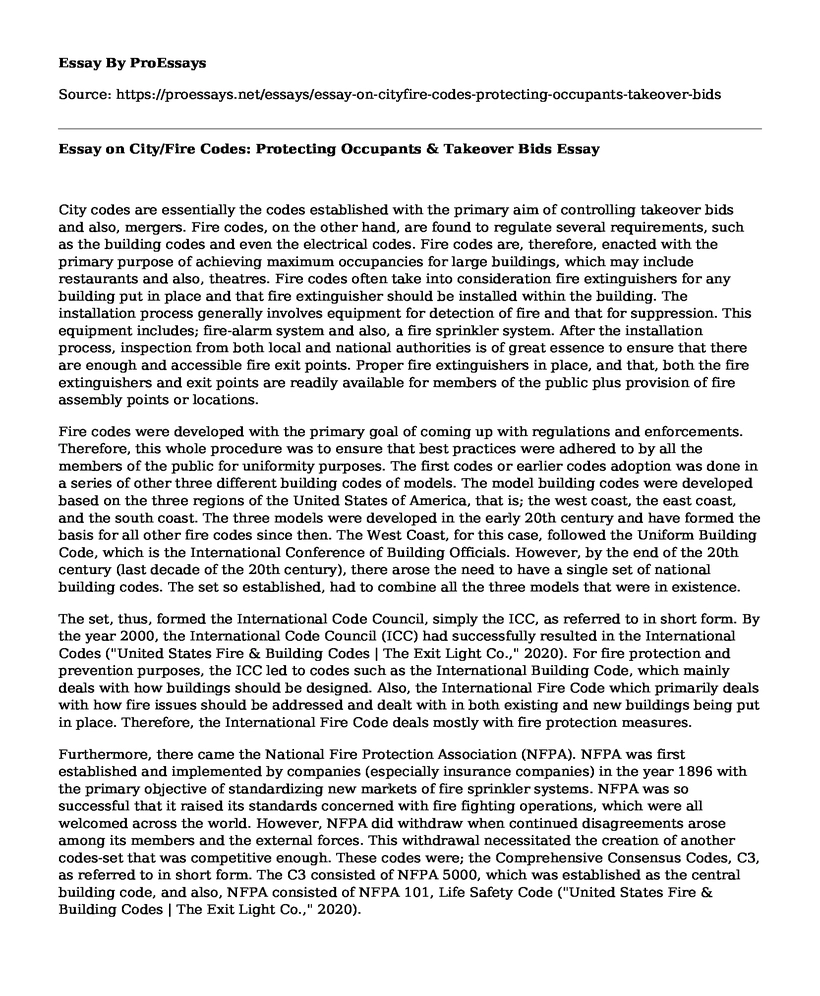City codes are essentially the codes established with the primary aim of controlling takeover bids and also, mergers. Fire codes, on the other hand, are found to regulate several requirements, such as the building codes and even the electrical codes. Fire codes are, therefore, enacted with the primary purpose of achieving maximum occupancies for large buildings, which may include restaurants and also, theatres. Fire codes often take into consideration fire extinguishers for any building put in place and that fire extinguisher should be installed within the building. The installation process generally involves equipment for detection of fire and that for suppression. This equipment includes; fire-alarm system and also, a fire sprinkler system. After the installation process, inspection from both local and national authorities is of great essence to ensure that there are enough and accessible fire exit points. Proper fire extinguishers in place, and that, both the fire extinguishers and exit points are readily available for members of the public plus provision of fire assembly points or locations.
Fire codes were developed with the primary goal of coming up with regulations and enforcements. Therefore, this whole procedure was to ensure that best practices were adhered to by all the members of the public for uniformity purposes. The first codes or earlier codes adoption was done in a series of other three different building codes of models. The model building codes were developed based on the three regions of the United States of America, that is; the west coast, the east coast, and the south coast. The three models were developed in the early 20th century and have formed the basis for all other fire codes since then. The West Coast, for this case, followed the Uniform Building Code, which is the International Conference of Building Officials. However, by the end of the 20th century (last decade of the 20th century), there arose the need to have a single set of national building codes. The set so established, had to combine all the three models that were in existence.
The set, thus, formed the International Code Council, simply the ICC, as referred to in short form. By the year 2000, the International Code Council (ICC) had successfully resulted in the International Codes ("United States Fire & Building Codes | The Exit Light Co.," 2020). For fire protection and prevention purposes, the ICC led to codes such as the International Building Code, which mainly deals with how buildings should be designed. Also, the International Fire Code which primarily deals with how fire issues should be addressed and dealt with in both existing and new buildings being put in place. Therefore, the International Fire Code deals mostly with fire protection measures.
Furthermore, there came the National Fire Protection Association (NFPA). NFPA was first established and implemented by companies (especially insurance companies) in the year 1896 with the primary objective of standardizing new markets of fire sprinkler systems. NFPA was so successful that it raised its standards concerned with fire fighting operations, which were all welcomed across the world. However, NFPA did withdraw when continued disagreements arose among its members and the external forces. This withdrawal necessitated the creation of another codes-set that was competitive enough. These codes were; the Comprehensive Consensus Codes, C3, as referred to in short form. The C3 consisted of NFPA 5000, which was established as the central building code, and also, NFPA consisted of NFPA 101, Life Safety Code ("United States Fire & Building Codes | The Exit Light Co.," 2020).
The fire codes were adopted with the primary purpose of forming a basis for protection and maintenance of best practices related to fire outbreaks and disasters. Code enforcement is done through legal support such that, where legal departments are given authority and expertise to enforce the codes. For states, State Marshals have given the duty to implement the codes ("Fire Prevention and Code Enforcement - Part III," 2020).
For inspection purposes, inspectors are allowed entry into any property for fire inspections even though the right of entry is often challenged. Through the enforcement of the fire codes, accessibility of fire exits should be achieved, fire detection and alarm systems should be in working conditions always, protection of the buildings should be assured, fire extinguishers should be installed in convenient places. Fire assembly points are decorated and set for emergency purposes, and also, all the available services should ensure that safety is adhered to and given the priority it deserves. Otherwise, without the enforcement of the codes, persons concerned will be held liable, and that, best fire protection and maintenance practices will not be achieved.
References
United States Fire & Building Codes | The Exit Light Co. (2020). Retrieved 26 January 2020, from https://www.exitlightco.com/Fire-Codes-Regulations.html
Fire Prevention and Code Enforcement - Part III. (2020). Retrieved 26 January 2020, from https://www.firehouse.com/prevention-investigation/article/10576309/fire-prevention-and-code-enforcement-part-iii
Cite this page
Essay on City/Fire Codes: Protecting Occupants & Takeover Bids. (2023, Mar 26). Retrieved from https://proessays.net/essays/essay-on-cityfire-codes-protecting-occupants-takeover-bids
If you are the original author of this essay and no longer wish to have it published on the ProEssays website, please click below to request its removal:
- Management Essay Example: Effective Change Agents in Organizations
- Importance of CEO Reputation Essay
- A Contemporary Nursing Leader: Dorothea Lynde Dix Paper Example
- Internal and External Communication Initiatives Essay
- Technical Skills of Csirt Team: Reply to Student's Post Paper Example
- Research Paper on Police Officers' Interactions Captured with Body-Worn Cameras
- Business Strategy - Free Report Sample







